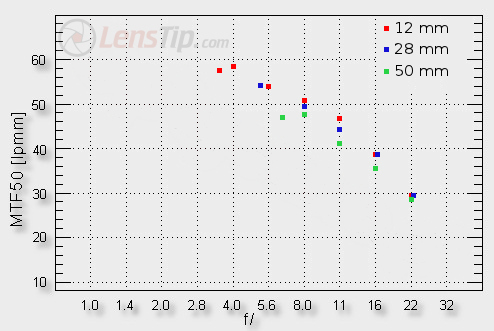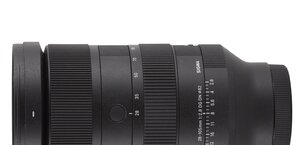Olympus M.Zuiko Digital 12-50 mm f/3.5-6.3 ED EZ
4. Image resolution
Let’s compare to those values the results the Olympus-M.Zuiko Digital 12–50 mm f/3.5–6.3 ED EZ got in the frame centre. An appropriate graph you can find below.

Please Support UsIf you enjoy our reviews and articles, and you want us to continue our work please, support our website by donating through PayPal. The funds are going to be used for paying our editorial team, renting servers, and equipping our testing studio; only that way we will be able to continue providing you interesting content for free. |
- - - - - - - - - - - - - - - - - - - - - - - - - - - - - - - - - - - - - - - - - - - - - - - -
It would be difficult to go into raptures here. The Olympus 12-50 mm has problems to pull level with the “pancakes” which are already a kind of compromise between a high image quality and small dimensions. Maximum results of less than 60 lpmm are certainly not impressive.
Even before we start criticizing Olympus – which is a producer known for its excellent optics – we must remind you here about two things. Firstly, the tested lens reaches the peak of its possibilities near the maximum relative aperture. It means the constructors tried to wring the optical performance as much as they only could. The result is such that in the frame centre there are no weak spots. The image is of good quality there and drops below the decency level on significant stopping down where the diffraction makes itself felt the most.
The second thing is the combination of the aperture of the lens and that diffraction. In the case of lenses tested on the E-PL1 the diffraction starts to limit seriously the image quality already near f/4.0 (the record results are mostly registered in the f/2.8-4.0 range). If a lens is slower than f/4.0 it can’t get high resolution values because already at the maximum relative aperture it is limited by the diffraction and other optical aberrations. On stopping down the lens you see the decrease of those but the diffraction level increases at the same time. Such a lens simply cannot spread its wings and you shouldn’t expect any records-breaking results.
Let’s check the situation on the edge of the frame.

Now it becomes clear what the lens constructors had on mind. The emphasis was put on a small, sealed casing and a good, even performance in the frame centre. With such assumptions you had to compromise somewhere. That compromise can be noticed when you check the MTFs on the edge, which are average at most. Officially the lens never gets higher than 42 lpmm which is considered by us to be the decency level. On the other hand at all focal lengths and the majority of apertures the lens is very close to that borderline. How you assess images from the Olympus 12-50 mm depends strongly on your personal decency level. If you are a demanding user and your private decency level is situated pretty high you most likely won’t be pleased. If your decency level is a bit lower than ours the Olympus performance won’t seem to be very bad.
At the end of this chapter we present some crops of our test chart taken from JPEG files.
 |






